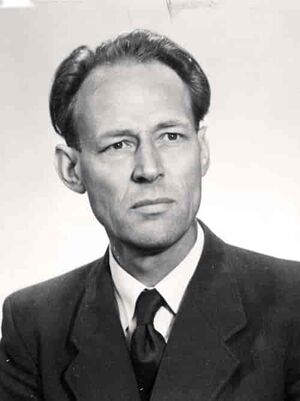Jens Haugland
(lawyer, politician) | |||||||||||||||||||||||
|---|---|---|---|---|---|---|---|---|---|---|---|---|---|---|---|---|---|---|---|---|---|---|---|
 | |||||||||||||||||||||||
| Born | 16 April 1910 | ||||||||||||||||||||||
| Died | 2 May 1991 (Age 81) | ||||||||||||||||||||||
| Nationality | Norwegian | ||||||||||||||||||||||
| Alma mater | University of Oslo | ||||||||||||||||||||||
| Party | Arbeiderpartiet | ||||||||||||||||||||||
Norwegian jurist and politician for the Labour Party. His opinions were on the left side of the party during the Cold War.
| |||||||||||||||||||||||
Jens Haugland was a Norwegian jurist and politician for the Labour Party. His opinions were on the left side of the party during the Cold War. [1]
Early Life
Haugland, son of farmer Nils Haugland and Anna Mjaaland, began to study law at the University of Oslo after attending school in 1932, graduating in 1936 as Candidatus juris (Cand. Jur.). During his studies he joined the Norwegian Labour Party and after graduating he took up a position as a lawyer. In 1943 he founded his own law firm in Kristiansand, but fled shortly afterwards to Sweden because of his work in the resistance against the German occupation forces, where he became secretary of the Norwegian legation in Stockholm until 1945.[2]
After the end of the Second World War, Haugland returned to Norway and started working as a lawyer. In addition, he began his political engagement in local politics and was a member of the Kristiansand City Council between 1945 and 1954. Between 1950 and 1954 he was also a member of the executive committee of the Labour Party there. In 1951 he was admitted to the bar at the Supreme Court (Norges Høyesterett).[2]
In the election of October 12, 1953, Haugland was elected as a candidate for the Labour Party for the first time as a member of the Storting, and sat there until 1973. At the beginning of his membership in parliament,from January 1954 to November 1955, he was a member of the electoral committee and a member of the judiciary committee.[2]
In government
From November 1955 to August 1963, during the third cabinet Gerhardsen, Haugland was Norwegian Minister of Justice and the Police, succeeding Jens Christian Hauge. During the fourth cabinet Gerhardsen from September 1963 to 1965, he was Norwegian Minister of Local Government and Labour.[2]
During his longstanding membership in the cabinet, in contrast to ministers Trygve Bratteli and Halvard Lange and long-time party secretary and Cold War hardliner Haakon Lie (who he thoroughly disliked), he was one of the prime minister's loyal supporters, especially in important foreign and defense policy decisions of the time, including no foreign bases and no nuclear weapons on Norwegian soil.
He had an ambiguous attitude towards Asbjørn Bryhn, the head of the intelligence service PST (Politiets sikkerhetstjeneste). He tried to restrict the influence and powers of the PST subordinate to him, through ministerial regulations.[2]
After Government
After leaving the government, he was a judge (Sorenskriver) in Setesdal between 1968 and 1980. After he was a member of the Judiciary Committee between October 1965 and September 1969, he served as chairman of the Storting Judiciary Committee during his last legislative period from October 1969 to September 1973. During this time he developed a more critical attitude to NATO than during his ministerial time and was also hostile to both the Greek military dictatorship and the CIAs role in creating it, as chairman of the Norwegian Committee for Greece (Den norske Hellaskomiteen) between 1968 and 1970.[2]
In addition, he was against Norwegian membership in the European Economic Community (later EU). Between 1975 and 1977 he was a member of the board of directors of Noregs Mållag, an association that advocates the promotion of Nynorsk as a written language and the use of dialect in all areas of the spoken language.